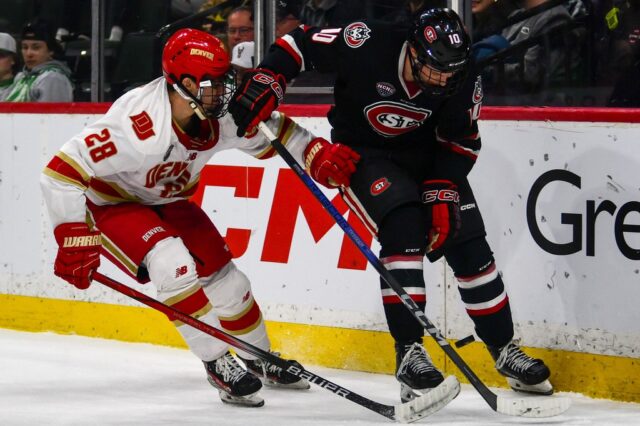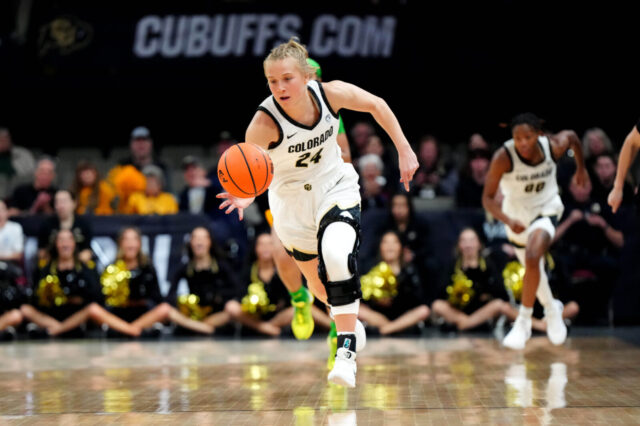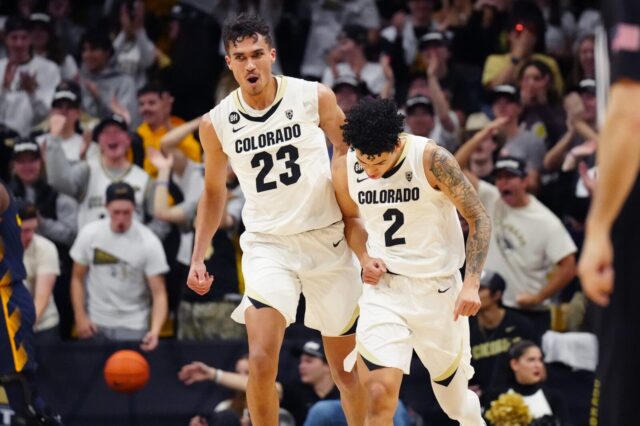Mike Bobo is catching a lot of flack for a rule his predecessor, Jim McElwain, put in place in 2012. Yes, Bobo decided to keep the rule which disallows first-year players in the program from speaking to the media — that was his choice — but the truth is that McElwain and Bobo are very different people who’ve dealt with their first head coaching gig at Colorado State in very different ways.
Jim McElwain was like the CEO of a company; Mike Bobo is a hands-on boss trying to influence members all the time.
With McElwain, it rarely seemed like you received a straight answer. If you gave him a question he didn’t like, he’d interrupt and make a joke to throw off your train of thought. If you pushed for your question, he’d give a one-word answer. McElwain was fiery — as everyone saw when he ripped that Florida player last year on the sideline — and he even stormed from a postgame press conference after only a few questions one time at CSU.
That storming away was a power play he may have learned from his former boss Nick Saban. It was a way to say, “I’m in charge here,” which Mac did many times during his CSU tenure.
In his second press conference with CSU, the National Signing Day one, he reiterated over and over again that he wasn’t going to anoint anyone and wouldn’t speak about any one of the players individually. Then, early, he ended his press conference with many more questions left unasked. So, we, the media, approached him and asked him more. Writhe with inexperience in wording questions, I asked if he expected any of the freshmen to play that year. “What did I say?!” he bellowed. “WHAT DID I SAY?!” he yelled again. A bit shaken and feeling like a son being scolded by his father, I didn’t know how to respond. “I said I wasn’t going to anoint anyone,” McElwain said angrily. Luckily, Chris Dempsey jumped in and reworded the question, asking what his policy was on playing true freshmen.
McElwain was in charge.
This all is relevant because the whole “first-year players aren’t allowed to speak to the media” rule began with McElwain. Coming from Alabama, the program who had won three of the last four National Championships. When he left for CSU, he must have felt like he was going to a D2 program. Those Rams in 2011 were terrible and they weren’t much better in 2012, either. McElwain inherited a program from Steve Fairchild which limped through three straight 3-9 seasons. They were consistently underprepared and were regularly blown out of games.
It’s important to note that under Fairchild, practices were open and every player was available to the media. Under McElwain — as he looked to make CSU like an SEC team in any way possible — practices were closed to the media and player availabilities were limited to 15-25 players.
Of course, part of the reason why McElwain was able to get hired at Florida is for turning a horrible program into a winner, going 8-6 and then 10-3 in his final two seasons in Fort Collins.
There was always a sense McElwain wasn’t allowing freshmen — or a vast majority of players — to speak to the media because he was hiding something. Maybe he knew the team wasn’t happy and didn’t want us looking for quotes supporting that. Or maybe he just wanted to be in complete control, or as close to it as possible, when it came to interactions with the media.
Bobo may have continued McElwain’s “first-year players can’t talk to the media” rule, but that’s about where the similarities between the two end, except for the fact that both were offensive coordinators at SEC schools and both are intelligent football minds and solid coaches, even if they do it different ways.
Bobo, a former quarterback in high school and at Georgia, has lived and breathed football since he was a youngster. He knows more about football than nearly anyone in the state of Colorado today, but he never condescends. If he doesn’t like a question, he doesn’t yell, Bobo thinks it through and gives an honest answer.
With McElwain, you rarely felt like you were getting the honest truth. With Bobo, it seems like he’s answering questions honestly, thoroughly. It’s like you’re sitting down and watching tape with Bobo and he’s explaining what he sees. McElwain was always trying to keep things closer to the chest.
In Monday’s weekly presser, Bobo gracefully sat up there and answered five or so questions regarding his “freshman can’t talk” rule, without getting angry or ending the conference early or even giving one-word answers. When I asked about the play of freshman quarterback Collin Hill, praising some of his better plays, Bobo was honest in saying a couple of them were under thrown; Bobo’s a harsh critic of his players, but he’s only pushing them to be better, not to say, “I’m smarter than you.” Nor does he come off that way in his media interactions.
The same goes for freshman Marvin Kinsey Jr. who had 97 yards rushing last Saturday, as Bobo said Monday he’s thinking too much and trying to do too much on his own, that Kinsey has to trust his coaches. Bobo knows the right buttons to push, and he knows how to get the most out of his players without disrespecting them. It’s shown as Jasen Oden said Bobo is like a father to the entire team following last year’s bowl loss.
“Bobo’s like a friend,” Oden told me after the NOVA Home Loans Arizona Bowl. “He’s like a father figure to everybody on this team. I’m just proud and happy to be part of this run.”
Truth be told, the “first-year players can’t talk” rule really emerged in 2013 when Kapri Bibbs wasn’t allowed to speak to the press even when he was busy rushing for 1,741 yards and 31 touchdowns, both CSU single-season records. Before Bibbs joined the team, when he was forced to attend Front Range Community College to get his grades up, when we’d ask McElwain about him he’d answer, “The legend of Kapri Bibbs.” And that was about it.
Maybe McElwain had a grudge with Bibbs and didn’t want him to talk with the media, afraid of what might be said. Bibbs didn’t even start that 2013 season, he didn’t start for the first four games of the year, but still ran for that insane amount of yards. McElwain and the coaching staff must’ve seen in practice that Bibbs was the best back, yet they didn’t start him. It made it all seem like McElwain was trying to teach the young back a lesson, and all of his players, in a way.
And now, four years later, that “first-year players can’t talk to media” rule is still in effect. It’s a bummer for media members who just want to ask a player like Hill or Kinsey, “How’d it feel to play that well in your first DI start?” Or, “What did you see on that touchdown run that told you to take off?” But, it’s not the end of the world.
For Bobo, it doesn’t seem like he’s trying to hide anything about the program by not allowing Hill, Kinsey and the many other freshmen to talk to the media, it just seems like he’s trying to protect the players from saying something silly which turns into billboard material for an opponent.
And Bobo doesn’t come off as a bad dude, he even said he would possibly lift the “first-year” rule later in the season as it moves forward. Last year, he allowed true freshman Izzy Matthews to speak after a game and it wouldn’t be surprising if Hill and Kinsey were allowed to talk later this year.
Mike Bobo is doing what he thinks is best for the program, as he explained Monday, which includes not putting too much spotlight on one, individual player when the game of football is quintessentially a team sport.
“Is it fair for the people that cover our team? Probably not, if I’m being honest,” Bobo explained. “But, fair to those young men that are just now going through and experiencing (college and being away from home)? I think it is, so they can focus on what they need to do to help this team.”
For Bobo to be painted in a poor light is wrong. He’s not a jerk. He’s not a dictator — even if one of his rules seems that way as it was left over from the previous regime. He’s simply a smart football man who’s trying to navigate the relatively new waters of being a head coach.



